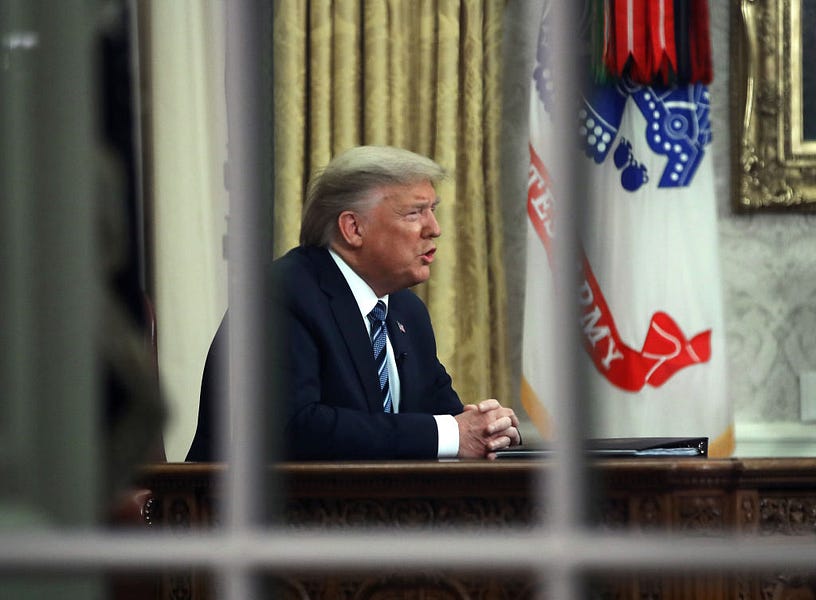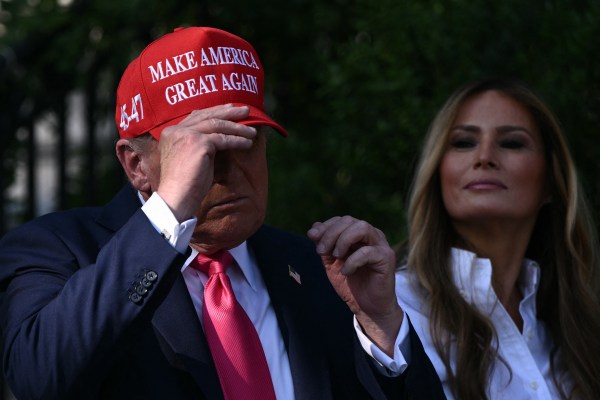Last night President Trump sat down to deliver a much-needed, serious address to the American people. It was time for the leader of the free world to acknowledge the obvious—the threat of coronavirus was real, and our government and our citizens were going to have to take serious and life-altering steps to combat its spread.
Then he botched it.
Minutes later, the White House staff repeated and amplified his mistakes.
In a prepared speech, in a time of national anxiety, he misstated the scope of his travel ban from Europe (it was not “all travel,” and he incorrectly applied it to “trade and cargo”), and he wrongly said that insurance companies “have agreed to waive all copayments for coronavirus treatments.” The waiver was for testing, not treatment.
Minutes later, even as the administration was scrambling to accurately state President Trump’s policies, the White House tweeted out the president’s inaccurate statement and incorrectly stated the policy in the text of the tweet:
These missteps tainted an otherwise welcome change in tone from the president. His sobriety constituted a remarkable reversal from days of wrongly downplaying the seriousness of the challenge. Given what we now face, this Washington Post timeline of Trump statements minimizing the seriousness of the virus makes for remarkable reading. Here are some choice excerpts:
Feb. 14: “We have a very small number of people in the country, right now, with it. It’s like around 12. Many of them are getting better. Some are fully recovered already. So we’re in very good shape.”
Feb. 24: “The Coronavirus is very much under control in the USA. … Stock Market starting to look very good to me!”
Feb. 26: “Because of all we’ve done, the risk to the American people remains very low. … When you have 15 people, and the 15 within a couple of days is going to be down to close to zero. That’s a pretty good job we’ve done.”
The president’s media allies doubled down on the president’s optimism, and they used their immense platforms to seed false information in the public. Again, a Washington Post timeline tells the tale.
Rush Limbaugh has been one of the chief offenders:
“I want to tell you the truth about the coronavirus,” he said on Feb. 24. “You think I’m wrong about this? You think I’m missing it by saying that’s — Yeah, I’m dead right on this. The coronavirus is the common cold, folks.”
He also repeatedly (and falsely) declared that the death rate for coronavirus was “less than the flu.”
And here was Sean Hannity speaking yesterday:
Gateway Pundit points out that as of yesterday that the President’s approval rating is fine and he’s getting pretty good grades on everything else. There’s an MIT guy I noticed on Twitter, and you know he’s saying pretty much the same thing he does research nearly every single day on immune systems he said quote “coronavirus fear-mongering by the Deep State will go down in history as one of the biggest frauds to manipulate economies, suppress dissent, and push mandated medicines.” May be true.
I can go on and on with serious mistakes and misrepresentations. In fact, on our Dispatch homepage, our own Alec Dent comprehensively debunked Matt Schlapp’s multiple false statements about Coronavirus on America’s Newsroom on Fox News, and I’d urge you to read every word of the New York Times report explaining American coronavirus testing delays—delays that reportedly continue to this day:
Moreover, if you want to move outside of government and the media, we have seen astonishing levels of individual incompetence and recklessness. Look at star Utah Jazz center Rudy Gobert mocking coronavirus concerns by touching a desk and microphone with his hands:
Gobert has since tested positive for coronavirus, the NBA has suspended its season, and earlier today we received this bit of ominous news about one of Gobert’s Jazz teammates:
To be sure, during any complex, unfolding crisis there will be bureaucratic snafus and misstatements. It’s a part of the human condition. No one is perfect. A person can be imperfect, however, but still be competent. They can still be excellent.
I know good and well that most Americans don’t take their public health cues from talk radio personalities (or even from the president himself). But I live in the heart of Red America, and I can cite to you chapter and verse from multiple conversations with people (including people I love) who do trust Hannity, Rush, and Trump to tell them the “real story.” Vulnerable people have been refusing to alter their behavior because people they trust have told them things that are not true.
My friend and Dispatch colleague Jonah Goldberg long ago wrote that “character is destiny,” and he’s right. Many folks, however, have scoffed at him—and me, when I repeat his argument. They point to historic figures of the past who battled their own personal demons—think of George S. Patton slapping soldiers suffering from what we’d now call PTSD or of the various (sometimes serious) faults and foibles of our Founding Fathers.
But competence is an aspect of character. Competence (much less excellence) requires a degree of self-discipline, commitment to personal improvement, and openness to critical information that are the hallmarks of developing true expertise. There is a difference between “brilliant but flawed” and simply “flawed.”
Finally, I use a term like “competence”—rather than simply “honesty”—advisedly. Incompetence certainly isn’t a complete explanation (recklessness, ambition, and greed play their own roles), but I don’t believe Sean Hannity or Rush Limbaugh are intentionally misleading their disproportionately elderly audiences. I don’t believe at all that they want to see Americans get sick or die. Neither does Trump.
Trump’s biggest fans made a bad bet on the abilities and judgment of the president, and many now have and express remarkable faith in him, even sometimes in the face of overwhelming contrary evidence. The president himself seems to have extraordinary confidence in his own instincts—again, often in spite of the evidence.
So men like Limbaugh and Hannity and Trump have been saying what they believe to be true—what they’ve convinced themselves is true—and their own flaws are blinding them to the facts and may well cost the American people dearly. Our best hope is that the competence and diligence of others can outweigh the profound mistakes of our president and his most potent public allies.
The war that never ends.
In the aftermath of the American strike on Qassem Suleimani and Iran’s retaliatory missile attack on American in Iraq, smart observers were careful to qualify that the crisis had eased only temporarily—that we wouldn’t know the true extent of Iranian retaliation for months, or perhaps years. There was little chance that the underlying conflict between the United States and Iran would end absent Iranian regime change.
And sure enough, last night brought bad news from Iraq:
Two Americans and one other coalition member were killed in a rocket attack on a base in Iraq on Wednesday night, a U.S. military spokesman said, potentially spiking tensions with Iran about two months after a series of bloody events that were capped by the death of an Iranian general in a U.S. drone strike.
At least 12 people were wounded in the attack at Camp Taji, about 17 miles north of Baghdad, according to the spokesman, Navy Capt. Bill Urban. About 18 Katyusha rockets hit the base, and five of the wounded were evacuated in serious condition, Urban said.
While Katyusha rockets aren’t as potent as the ballistic missiles Iran launched from its own soil in direct retaliation for the Suleimani strike, they’re powerful weapons—far more powerful than the random mortar attacks or single rocket strikes that are often used to harass American troops. This was an attack that was intended to kill, and to kill at scale.
Iran is facing its own much more dire battle with the coronavirus and is hardly in the military or economic condition to initiate a serious military confrontation with the United States, but it has never wanted a serious fight. Instead acting sometimes directly and often through proxies it inflicts as many American casualties as it can without triggering a catastrophic American response. This is the nature of Iran’s war against America, and it most assuredly goes on.
One last thing …
The NBA has suspended its season, and aside from the men and women who make their living in the league or from the league, the French Press is hardest hit. But this was a nice moment last night—Vince Carter, a man who had one of the most exciting and unique careers in league history, may well have ended his career on a high note. Watch and enjoy:
Photograph of Donald Trump in the Oval Office by Mark Wilson/Getty Images.







Please note that we at The Dispatch hold ourselves, our work, and our commenters to a higher standard than other places on the internet. We welcome comments that foster genuine debate or discussion—including comments critical of us or our work—but responses that include ad hominem attacks on fellow Dispatch members or are intended to stoke fear and anger may be moderated.
With your membership, you only have the ability to comment on The Morning Dispatch articles. Consider upgrading to join the conversation everywhere.